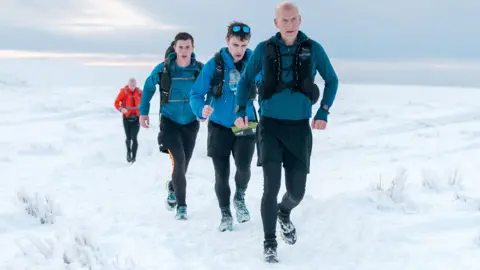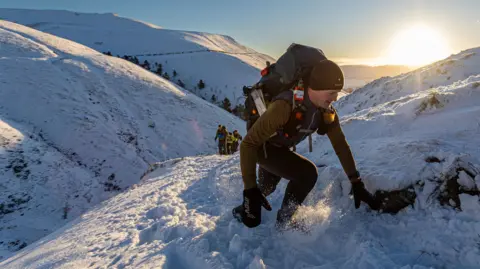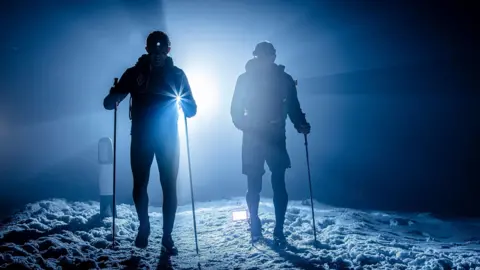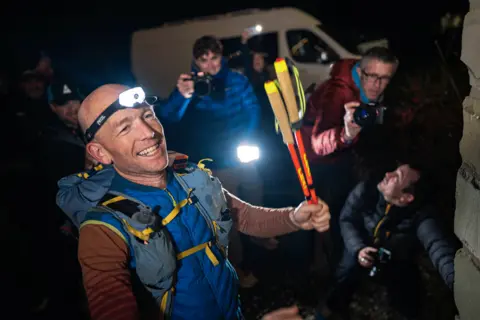Spine racers cover 268 miles in snow and ice to reach Scotland
Britain's most brutal endurance race has lived up to its reputation with close to half of the starters dropping out by midway.
Chest-high snow drifts and freezing temperatures have made this year's 268-mile (430km) Montane Spine Race - between Derbyshire and the Scottish Borders - amongst the toughest in its short history.
Despite the challenges, a queue to take part in next year's event is already forming.
Race director Phil Hayday-Brown said: "This race is a proper adventure and that appeals to the ultra running community."
 Andrew Hendry / Montane Winter Spine Race
Andrew Hendry / Montane Winter Spine RaceThe first major running endurance races emerged on the back of the marathon boom of the 1980s.
Events such as the multi-stage Marathon des Sables - across the Sahara desert - and the Barkley Marathons in Tennessee quickly gained cult status.
Over the past couple of decades most long-distance routes around the world now have some form of ultra-marathon attached to them - including, in Scotland, the West Highland, Kintyre and Southern Upland ways.

But the Montane Winter Spine - with its single non-stop 268-mile stage along the Pennine Way - has emerged as one of the world's toughest challenges.
Mr Hayday-Brown said: "We didn't realise when we started that ultra running was so big.
"We came from a polar world of racing to the North Pole, and we brought that with us when we found the Pennine Way.
"The corner of the Border Hotel has become an iconic finish that is now known around the world."
 Jamie Rutherford / Montane Winter Spine Race
Jamie Rutherford / Montane Winter Spine Race Chris Morgan
Chris MorganThe inaugural Winter Spine Race in 2012 attracted just 11 starters, with only three of them reaching the Border Hotel wall in Kirk Yetholm.
In the following few years the race's reputation grew with more and more athletes from around the world wanting to challenge themselves against some of Britain's toughest terrain and conditions.
And in 2019 the race's profile was raised further when Edinburgh's Jasmin Paris - who went on to become the first woman to ever complete the Barkley Marathons - smashed the overall course record in a time just over 83 hours.
Last year Jack Scott went even faster by reaching the finishing line a few minutes under 73 hours.
 Adam Jacobs / Montane Winter Spine Race
Adam Jacobs / Montane Winter Spine RaceSnow storms and freezing temperatures greeted this year's 150 starters as they left Edale in Derbyshire.
Despite 268 miles in front of them and over 10,000m (32,000ft) of climbing - more than 1,000m more than Mount Everest - the pace was quick over the first day and night in the Peak District.
But the thaw on Monday and Tuesday presented its own challenges through Yorkshire with boggy conditions leading to the front runners dropping off course record pace.
British international athlete Kim Collison, who is from near Penrith in the Lake District, already holds several endurance records, had opened up a gap of about eight-to-nine miles by the time he had reached the home straight along the Anglo-Scottish border.
He touched the famous Border Hotel wall exactly 82 hours and 46 minutes after leaving Edale.
 Andrew Hendry / Montane Winter Spine Race
Andrew Hendry / Montane Winter Spine Race
He completed the race for the first time at the fourth attempt and was able to savour his victory in the closing stages.
"It felt like I was kind of floating on a cloud for probably the last two hours not a couple of miles," he said.
"It was just all smiles - four years of delayed gratification all coming out in that one moment.
"Running into the crowds and seeing the wall was particularly special."
The women's race was won by Lucy Gossage in a time of 87 hours, 41minutes and 38 seconds - she had to draw in and overtake early leader Robyn Cassidy.
"When I caught Robyn I knew I had her, we were both running my race," she said.
It was an improvement from her third place finish in the same event last year.
